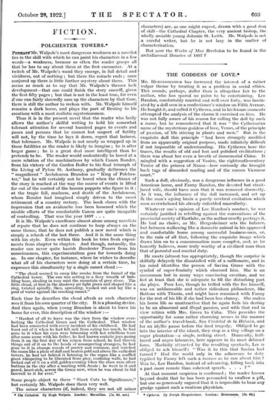THE GODDESS OF LOVE.* MR. HERGESIIEIMER has increased the interest
of a rather vulgar theme by treating it as a problem in social ethics. This sounds, perhaps, duller than is altogether fair to the author, who has spared no pains to be entertaining. Lee Bandon, comfortably married and well over forty, was fascin- ated by a doll seen in a confectioner's window on Fifth Avenue. He bought it, and called it Cytherea, and in his leisure moments attempted the analysis of the charm it exercised on him. He was not fully aware of his reason for calling the doll by such a name, but he remembered that it was " the Cytheranian name of the mysterious goddess of love, Venus, of the principle of passion, of life stirring in plants and men." But in the exquisite doll this principle " had been strangely modified from an apparently original purpose, made infinitely difficult if not impossible of understanding. His Cytherea. bore the traces, the results of old and lost and polished civilizations ; there was about her even a breath of immemorial China. It mingled with a suggestion of Venice, the eighteenth-century Venice of the princes of Naxos—how curiously she brought back tags of discarded reading and of the rococo Viennese court."
Such a doll, obviously, was a dangerous influence in a good American home, and Fanny Bandon, the devoted but strait- laced wife, should have seen that it was removed discreetly. As it was, the influence of the doll increased, and set up iii the man's ageing brain a purely cerebral excitation which soon overwhelmed his already enfeebled masculinity.
Whatever one's opinion of Lee Randon's conduct, he was certainly justified in rebelling against the conventions of the provincial society of Eastlake, as the author cruelly portrays it. He had no choice, as Mfr. Hergesheimer sets the balance, but between wallowing like a domestic animal in his approved and comfortable home among successful business-men, or, to the ruin of all that, following the exquisite image which draws him on to a consummation more complex, and, as he honestly believes, more truly worthy of a civilized man than that of parental and marital duty.
He meets (almost too appropriately, though the surprise is skilfully delayed) the dissatisfied wife of a millionaire, and in his mind identifies the person of Saving Grove with the symbol of super-feminity which obsessed him. She is an uncommon but in many ways convincing creation, and we feel at least that she is adequate to fill the disturbing part she plays. Poor Lee, though he trifled with the fire himself, was an unblameable and rather ridiculous philanderer, like Bottom with Titania, and might have remained with Fanny for the rest of his life if she had been less clumsy. She makes his home life so unattractive that he again feels his destiny to be an abnormal and illegal passion, and with that end in view retires with Mrs. Grove to Cuba. This provides the opportunity for some rather charming scenes in the manner of the author's travel-book, San Cristobal de /a Haliaiia, and for an idyllic pause before the final tragedy. Obliged to go into the interior of the island, they stop in a tiny village on a sugar plantation—a single, reeking street. Humanity, half- breed and negro labourers, here appears in its most debased form. Morbidly attracted by the revolting spectacle, Lee is obliged to ask himself : " Was it to this that Savina had turned ? Had the world only in the adherence to duty typified by Fanny left such a morass as he saw about him ? Was he, Lee Randon, instead of advancing, falling back into a past more remote than coherent speech. . . . ? " - At that moment suspicion is confirmed ; the reader knows beyond doubt that he has been persuaded to swallow ,a pill, but one so generously sugared that it is impossible to bear any grudge against such a cautious physician.
• Cgtlarea. By Joseph Hergesheimer. London.: Heinemann. [7a. ed4










































 Previous page
Previous page